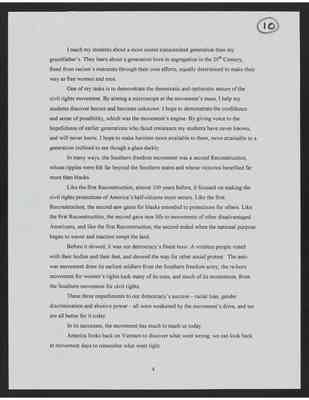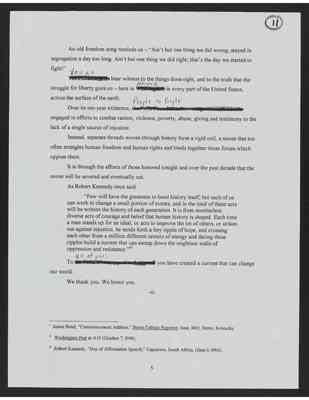Pages
11
10 I teach my students about a more recent transcedent generation than my grandfather's. They learn about a generation born in segregation in the 20th Century, freed from racism's restraints through their own efforts, equally determined to make the way as free women and men.
One of my tasks is to demonstrate the democratic and optimisic nature of the civil rights movement. By aiming a microscope at the movement's mass, I help my students discover heroes and heroines unknown. I hope to demonstrate the confidence and sense of possibility, which was the movement's engine. By giving voice to the hopefulness of earlier generations who faced resistance my students have never known, and will never know. I hope to make heroism more available to them, more attainable to generation inclined to see though a glass darkly.
In many ways the Southern freedom movement was a second Reconstruction, whose ripples were felt far beyond the Southern states and whose victories benefited far more than blacks.
Like the first Reconstruction, almost 100 years before, it focused on making the civil rights protections of America's half-citizens more secure. Like the first Reconstruction, the seccond saw gains for blacks extended to protections for others. Like the first Reconstruction, the second gave new life to movements of other disadvantaged Americans, and like the first Recconstruction, the second ended when the national purpose began to waver and reaction swept the land.
Before it slowed, it was our democracy's finest hour. A voteless people voted with their bodies and their feet, and showed the way for other social protect. The anit-war movement drew its earliest soldiers from the Southern freedom army, the re-born movemet for women's rights took many of its cues, and mch of its momentum, from the southern movement for civil rights.
These three impediments to our democracy's success - racial bias, gender discrimination and abusive power - all were weakened by the movement's drive, and we are all better for it today.
In its successes, the movement has much to teach us today.
America looks back on Vietnam to discover what went wrong; we can look back at movement days to remember what went right.
12
11
An old freedom song reminds us - "Ain't but one thing we did wrong; stayed in segregation a day too long. Ain't but one thing we did right; that's the day we started to fight!"
The Petral Fellows You all bear witness to the thing done right, and to the truth that the struggle for liberty goes on - here Washington Norfolk, in every part of the United States, across the surface of the earth.
Over its ten-year existence, the Petra Foundation has recognized individuals People to People engaged in efforts to combat racism, violence, poverty, abuse, giving sad testimony to the lack of a single source of injustice.
Instead, separate threads woven through history form a rigid coil, a noose that too often stangles human freedom and human rights annnd binds together those forces which oppose them.
It is through the efforts of those honored tonight and over the past decade that the noose will be severed and eventually cut.
As Robert Kennedy once said: "Few will have the greatness to bend history itself, but each of us can work to change a small portion of events, and in the total of these acts will be written the history of each generation. It is from numberless diverse acts of courage and belief that human history is shaped. Each time a man stands up for an ideal, or acts to improve the lot of others, or strikes out against injustice, he sends forth a tiny ripple of hope, and crossing each other from a million different centers of energy and daring these ripples build a current that can sweep down the mightiest walls of oppression and resistance."iii
To the Petra winners, past and present All of you; you have created a current that can change our world.
We thank you. We honor you.
-0i James Bond, "Commencment Address," Berea College Reporter. June, 1892, Berea, Kentucky. ii Washington Post ar A19 (October 7 1998). iii Robert Kennedy, "Day of Affirmation Speech," Capetown, South Africa, (June 6, 1966).

